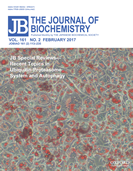
Laboratory tour
We invite all undergraduate and graduate students who have an interest in our laboratory to come and visit.

Currently accepting enrolments
for graduate students
We are currently accepting students for doctoral and master's programs. Students from non-medical disciplines that are related to biological science are also welcome. Why not conduct research into biological science together with us?
Research Mission & Overview
We are currently progressing in research centering on ubiquitination, the post-translational modification of proteins, with the control of proteolysis of proteins as the theme. The process of ubiquitination is involved in various biological functions such as cancer, the immune system, signaling, and neural differentiation. Research is being conducted with a goal to prevention and treatment; the objective of the basic research is the identification and functional analysis of ubiquitination enzyme systems; while, as for clinical research, the involvement of ubiquitination and phosphorylation in diseases related to cancer, the immune system, and neurodegeneration are being investigated.
2017.10.13: Function of target protein recognized by cerebellar ataxia-related autoantibody
A paper by H. Yaguchi was published in Bichemical and Biophysical Research Communications.
「Sez6l2 regulates phosphorylation of ADD and neuritogenesis」
Biochem. Biophys. Res. Commun., 494, 234-241, 2017. doi.org/10.1016/j.2017.10.047
2017.9.11: Fine-tuning of thymocyte development by ubiquitination-mediated stability control of the ESCRT protein CHMP5
A research highlight was published in Cellular & Molecular Immunology
(NPG).
「Fine-tuning of thymocyte development by ubiquitination-mediated stability control of the ESCRT protein CHMP5」
Cell. Mol. Immunol.,14, 957-959, 2017, doi.org/10.1038/cmi.2017.91
2017.1.22: Roles of TRIM family proteins in autophagy, immunity, and carcinogenesis
A review article by S. Hatakeyama was published in Trends in Biochemical Sciences (Cell Press).
「TRIM family proteins: roles in autophagy, immunity, and carcinogenesis」
Trends Biochem. Sci. 42, 296-310, 2017, doi.org/10.1016/j.tibs.2017.01.002
2016.9.20: The involvement of TRIM proteins in diseases
A review article by M. Watanabe was published in The Journal of Biochemistry.
「TRIM proteins and diseases」
J. Biochem., 161, 135-144, 2017. doi.org/10.1093/jb/mvw087
2016.9.15: Regulation of the metabolism of heart by RNF207
A paper by W. Mizushima was published in Journal of Molecular and Cellular Cardiology.
「The novel heart-specific RING finger protein 207 is involved in energy metabolism in cardiomyocytes」
J. Mol. Cell. Cardiol., 100, 43-53, 2016. doi.org/10.1016/j.yjmcc.2016.09.013
2016.6.3: Regulation of the transcription of snRNA genes by p53 and LEC
A paper by D. Anwar was published in Biochimica et Biophysica Acta - Gene Regulatory Mechanisms.
「p53 represses the transcription of snRNA genes by preventing the formation of little elongation complex」
BBA-GRM, 1859, 975-982, 2016. doi: 10.1016/j.bbajrm.2016.06.001
2016. 2.16: Introduction of our laboratory in home page of Hokkaido University Graduate School of Medicine: "Research Archives"
Hokkaido University Graduate School of Medicine「Research Archives」
2016.1.28: The role of TRIM29 in multiple cancer models
An editorial by S. Hatakeyama was published in Expert Opinion on Therapeutic Targets.
「 Early evidence for the role of TRIM29 in multiple cancer models」
Expert Opin. Ther. Targets, 20, 767-770, 2016. doi: 10.1517/14728222.2016.1148687
2015.11.18: Outreach activity for Ritsumeikan Keisho Junior High School
Our outreach program was performed for the students of Ritsumeikan Keisho Junior High School.
A lesson and practices were given to students by teachers of our laboratory and Department of Otolaryngology.




2015.9.7: TRIM39 regulates the NFkB-mediated signaling pathway
A paper by M. Suzuki was published in Cellular and Molecular Life Sciences.
「 TRIM39 negatively regulates the NFkB-mediated signaling pathway through stabilization of Cactin」
Cell. Mol. Life Sci., 73, 1085-1101, 2016, doi: 10.1007/s00018-015-2040-x
2015.6.22: TRIM29 regulates DNA repair proteins
A paper by Y. Masuda was published in Nature
Communications.
「 TRIM29 regulates the
assembly of DNA repair proteins into damaged chromatin」
Nature Commun., 6, 7299, 2015, doi: 10,1038/ncomms8299
2015.6.10: TRIM29 regulates gene expression in cervical cancer cells
A paper by Y. Masuda was published in Biochimica et Biophysica Acta - Molecular Cell
Research.
「 TRIM29 regulates the p63-mediated pathway in
cervical cancer cells」
BBA-MCR, 1853, 2296-2305, 2015, doi: 10.1016/j.bbamcr.2015.05.035
2015.4.23: TRIM23 regulates adipocyte differentiation
A paper by assistant professor M. Watanabe was published in eLife.
「The E3 ubiquitin ligase TRIM23 regulates adipocyte differentiation via stabilization of the adipogenic activator PPAR gamma」
eLIFE, 4, e05615, 2015, doi: 10.7554/eLife.05615
Applications open for school visits, external classes, and seminars
We are the people charge of the research and education at School of Medicine and Graduate School of Medicine in Hokkaido University.
We are currently operating an outreach activity program that provides external classes to middle schools, high schools, and other university based on our experiences.
The aim of this program is to contribute to the future education of young people, so that they may have a chance to come into contact with medical research, such as molecular biology and cancer.
Previous Outreach Activities:
2016.9.11: Outreach activity at Asahikawa East Senior High School
2015.11.18: Outreach activity at Ritsumeikan Keisho Junior High School
2014.9.20: Outreach activity at Rumoi Senior High School
2014.7.21: Outreach activity at Asahikawa East Senior High School
2014.5.27: Outreach activity at Hokkai Gakuen Senior High School

Applications open for graduate students
Please see graduate student applications for Hokkaido University Graduate School of Medicine. We are also looking for students from non-medical disciplines with backgrounds in biological sciences.
If you have an interest in learning about medical biology research centered on protein proteolysis (ubiquitination) and post-translational modification of proteins at Hokkaido University Graduate School of Medicine, then please contact our laboratory!
You'll be able to learn all sorts of basic life science research (proteomics, genetically modified mice generation, etc.) that is needed for the development of diagnosis and therapeutic techniques to identify and treat diseases.
- Department of Biochemistry,
Faculty of Medicine and Graduate School of Medicine,
Hokkaido University - Kita 15, Nishi 7, Kita-ku, Sapporo,
Hokkaido 060-8638, Japan
TEL: +81-11-706-5047
FAX: +81-11-706-5169



